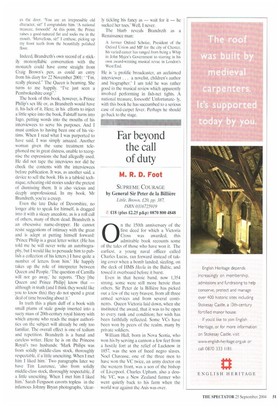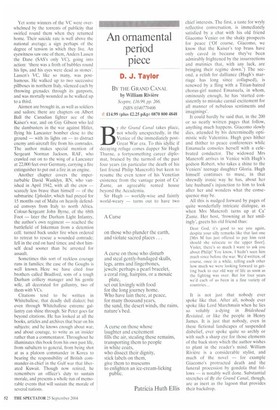Far beyond the call of duty
M. R. D. Foot
SUPREME COURAGE by General Sir Peter de la BiWere Little, Brown, £20, pp. 387.
ISBN 0316725919 £18 (plus £2.25 p&p) 0870 800 4848
0 n the 150th anniversary of the first deed for which a Victoria Cross was awarded, this admirable book recounts some of the tales of those who have won it. The earliest, a young naval officer called Charles Lucas, ran forward instead of taking cover when a bomb landed. sizzling, on the deck of HMS Hecla in the Baltic, and tossed it overboard before it burst.
Even in that heroic band, now 1,354 strong, some were still more heroic than others. Sir Peter de la Billiere has picked out a few of the very bravest, from all three armed services and from several continents. Queen Victoria laid down, when she instituted the award, that it was to be open to every rank and condition; her wish has been faithfully reflected. Some VCs have been won by peers of the realm, many by private soldiers.
William Hall, born in Nova Scotia, who won his by serving a cannon a few feet from a hostile fort at the relief of Lucknow in 1857, was the son of freed negro slaves. Noel Chavasse, one of the three men to have won the VC twice, an army doctor on the western front, was a son of the bishop of Liverpool. Charles Upham, also a double VC, was a New Zealand farmer who went quietly back to his farm when the world war against the Axis was over. Yet some winners of the VC were overwhelmed by the torrents of publicity that swirled round them when they returned home. Their suicide rate is well above the national average; a sign perhaps of the degree of tension in which they live. An eyewitness saw one of them, Anders Lassen the Dane (SAS's only VC), going into action: 'there was a froth of bubbles round his lips, and his eyes were dead as stones'. Lassen's VC, like so many, was posthumous. He walked up to two successive pillboxes in northern Italy, silenced each by throwing grenades through its gunports, and was mortally wounded as he walked up to a third.
Airmen are brought in, as well as soldiers and sailors; there are chapters on Albert Ball the Canadian fighter ace of the Kaiser's war, and on Guy Gibson who led the dambusters in the war against Hitler, flying his Lancaster bomber close to the ground — with its lights on — to distract enemy anti-aircraft fire from his comrades. The author makes special mention of Sergeant Norman Jackson, RAF, who crawled out on to the wing of a Lancaster at 22,000 feet over Germany, carrying a fire extinguisher to put out a fire in an engine.
Another chapter covers the imperturbable David Wanklyn, RN, who van ished in April 1942, with all the crew scarcely less brave than himself — of the submarine Upholder, which had preyed for 15 months out of Malta on heavily defended convoys from Italy to north Africa. Colour-Sergeant John Byrne, of the 68th Foot — later the Durham Light Infantry, the author's own regiment — reached the battlefield of Inkerman from a detention cell; turned back under fire when ordered to retreat to rescue a wounded comrade; fell in the end on hard times; and shot himself dead sooner than be arrested for assault.
Sometimes this sort of reckless courage runs in families; the case of the Goughs is well known. Here we have cited four brothers called Bradford, sons of a tough Durham colliery manager and his gentle wife, all decorated for gallantry, two of them with VCs.
Citations tend to be written in Whitehallese, that deadly dull dialect; but even through Whitehallese extreme gallantry can shine through. Sir Peter goes far beyond citations. He has looked at all the books, articles and archives that bear on his subjects; and he knows enough about war, and about courage, to write as an insider rather than a commentator. Throughout he illuminates this book from his own past life, from subaltern to general, from being shot at as a platoon commander in Korea to bearing the responsibility of British commander-in-chief in the Gulf war that liberated Kuwait. Though now retired, he remembers an officer's duty to sustain morale, and presents a whole run of memorable events that will sustain the morale of several nations.



























































































 Previous page
Previous page